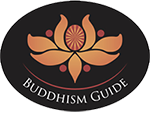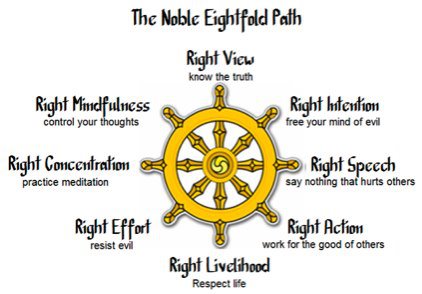In the fourth of Buddha’s truths he explains the path we need to take to free ourselves from suffering. It is known as the Eightfold Path and it comprises of three aspects:
Seeing Clearly
- Right View
- Right Intention
Living Responsibly
- Right Speech
- Right Action
- Right Livelihood
Staying Focused
- Right Effort
- Right Mindfulness
- Right Concentration
Over the next few postings I will cover all of these eight points.
Right View – setting off on the Eightfold Path without the right view is like starting a journey without a map. If you get into your car without knowing where your going and what landmarks you will encounter along the way, you are bound to get lost. Similarly, if you set off on this path and have no idea what you are doing, you will also become lost and disillusioned. First get the view correct, and the rest of the path will become clearer. You will be able to dispel any confusion or misunderstandings, and have a better understanding of reality.
We need to understand the Four Noble Truths and the workings of cause and effect. This is the right view.
When we understand the Four Noble Truths, we will also understand that the causes of our suffering lie within our own minds, we will then realise that nirvana, the escape from suffering, also lies within our minds. Once we know this we will want to look for the causes of this suffering, which are the three poisons; attachment, anger and unawareness. Finally, having understood that life is suffering, we will be ready to set off along the Eightfold path.
We should also ensure we have an understanding of cause and effect. Here some would say we actually need to understand the workings of karma, but this is such a hot potato these days.
If you believe in karma and rebirth, and it motivates you to be a good person, then follow that view. However, if you are not a lover of rebirth and prefer to keep your Buddhism firmly planted in this life, then you should understand cause and effect.
Whatever we do there will be a result. If we kill someone, we will be punished. If we lie and cheat people, we will be disliked. If we are unwilling to help people, they will not want to help us when we need it. If we are a kind, caring and compassionate person, people will be drawn to us. If we are generous, we will get back far more than we give – here I am not talking in monetary terms, but in the wonderful satisfaction of helping others.
Life is like an echo. Whatever you put out, comes back. Whatever you sow, you will reap. Whatever you give, you will get. Whatever we do will always come back to us. This is not some metaphysical dogma, just plain common-sense. It is the way life is.
So by understand cause and effect we will be driven to act in a kind and compassionate way. If you understand it and still decide to act in an unhelpful way, you will only have yourself to blame when things don’t go right for you.
Once you have the right view concerning suffering and cause and effect, you will be ready to move along the path. Next time I will talk about right intention.


Hi Yeshe. It’s wonderful how the Dharma is so useful and practical whether or not we believe in rebirth. Thanks for explaining so clearly once again.
@Patrick: Yes, that’s why it is said that Dharma is good at the beginning, it is good in the middle and it is good in the end. But it is also interesting as I read in your comment that rebirth is considered something esoteric, as something difficult to believe in. Nobody is asking you to believe! Buddha, by the way, was never talking about rebirth. The term he was using is bhava = becoming. I think this is one of the major misunderstandings especially with people interested in Tibetan Buddhism. The doctrine of Tulku-reincarnation and the Bardo-teachings are very esoteric and I guess most people coming from the sciences have difficulties believing them. But this is not necessary - what is important is to understand that bhava as taught by Buddha is not esoteric at all and if it is actually happening according to the Bardo-teachings is not really that important unless you are so advanced to benefit from them in your practice. People focus on what is after death and because they identify with their body they think that after death the body perished and so they are gone, have disappeared. But then they never focus on what was before conception/birth - before their body was created! Is the state of being after the body any different from the state of being before the body? So, if you have become once, why not again and again? And if we understand that we (be)come from causes and conditions, that our individual existence is the result of the evolution, the environment of a planet, that at the time of death we have become someone else than that little Baby we once were, then we can understand that rebirth is a fact and we can even come to a non-esoteric understanding of Karma (what does not mean fate). Of course there is much more to say but lets stop here… 😉